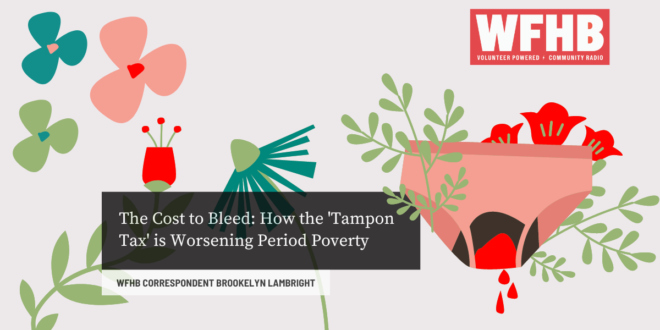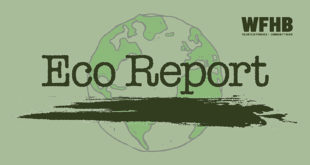Podcast: Play in new window | Download (Duration: 11:51 — 10.9MB)
Subscribe: RSS
An Indiana bill repealing state tax on menstrual products was denied a hearing; how period poverty impacts women nationwide.
Worldwide there are nearly 800,000,000 people who menstruate. Every 28 days they experience a variety of symptoms such as cramps, nausea, bloating, mood swings, fatigue, acne, and bleeding for nearly seven days straight. 500,000,000 of those people lack the resources they need to manage their menstrual cycle.
In the United States, one-third of low income women miss commitments like school or work because of a lack of access to affordable menstrual care. There’s only one federal law that addresses these issues. The First Step Act, codified by Congress in 2018 which requires federal women’s facilities to supply free menstrual products.
As of June 20, 2023, 21 states still charge sales tax on menstrual products. This does not include any provisions on access to period products in schools, private prisons, and homeless shelters. Those without access to quality period products may extend the life of a tampon or pad in order to cut on costs. This increases the chance of toxic shock syndrome, reproductive tract infections, negative pregnancy outcomes, and the Human Papillomavirus. Beyond the health risks acquired by a lack of access to period care, a lack of menstrual products can lead to greater feelings of humiliation and exclusion.
Jennifer Gaines, the Program Director for Alliance of Period Supplies, an organization that works to provide period products to women in need while also advocating for greater period equity, says additional taxes on menstrual supplies can make it difficult for families on a budget to purchase the products they need.
“And so by reducing and eliminating that tax we will continue to advance equity- specifically gender equity. There’s no reason why period products are taxed, and other things are not. Period products are essential. So removing that tampon tax will create a message that these products are essential, they’re not a luxury and it will also remove the undue burden and additional burden of the financial constraints. I know people who can’t afford them, and are able to access them a little bit more because that restraint is removed. So we’re only paying a few cents on the dollar, but that can make or break a family’s decision on whether or not they choose period products with their limited funds, or they go to the grocery store and buy food to support their families,” said Gaines.

Indiana is among one of the 21 states nationally that still tax menstrual products. In the last legislative session, State Senator Shelli Yoder for Indiana’s 40th District authored Senate Bill 259 which proposed removing taxes on menstrual products. The bill however never made it to a hearing.
Items in Indiana are taxed if the state legislature determines they are a luxury. Yoder says placing a tax on menstrual items is spreading the wrong message about their necessity. Menstrual products are not a want but a need for people who menstruate.
“Now we’ve made a decision that other items like food we would not tax because people need food to survive. So we’re not going to build an economy on the backs of people needing to eat food. But we have decided to build an economy off the backs of women. And what my bill is say, no more. Indiana is going to join with the other states who now recognize this as an unconstitutional tax. We’re going to repeal the tax on menstrual products […] You can’t leave your home, you can’t go to school, you can’t go to work, unless you have menstrual products. You can’t be in the same spaces as men without menstrual products. And my bill would just say, in Indiana, we recognize that as a constitutional right, and so we are not going to tax menstrual products any longer,” said Yoder.

The issue with the bill wasn’t its lack of support, in fact SB 259 had bipartisan support. Kyle Walker, the Republican State Senator for Indiana’s District 31 co-authored the bill. Yoder says the issue with the bill is the loss of tax revenue the state would lose if taxes on period products were eliminated. Yoder estimates the state receives nearly $5 million annually off of taxed menstrual products.
“They wouldn’t even hear the bill. And I had so many conversations. I wrote letters, had face to face conversations, and had bipartisanship with actually filing the bill […] This is not a partisan issue. This is an issue that had a coalition built to get it passed, but there wasn’t the will to let go of the revenue that’s created by it. And to me, it’s outrageous that in the same year, we’re going to build an economy on the backs of women while we are stripping away their rights,” said Yoder.
But tax revenue isn’t the only reason the bill was denied a hearing. Yoder says discussing periods in the statehouse was uncomfortable for some legislators.
“ I would say due to the lack of education and due to what continues today to be a discomfort about talking about menstrual cycles and periods; a reality that every person with a uterus has for about 20 to 30 years of their life and impacts them every 28 days. That is certainly on the minds of people who have menstrual cycles, but a real discomfort among those who have the power to do something about it […] We have made a choice in this legislature to not tax certain items and it feels like we are intentionally going to tax these products. So it all came down to just a lack of will to want to have this conversation in public because I think deep down there is this taboo about talking about women’s bodies, unless we are silencing them, or banning them,” said Yoder.
Both SB 1, Indiana’s abortion ban, and SB 259 were proposed in the same legislative session. However while SB 1 made it through the statehouse complete with a signature from Governor Eric Holcomb, SB 259 still awaits a hearing. Yoder says it is important the legislature considers a tax exemption on menstrual products. The bill proposed would not allow for free products, but it would ensure lawmakers don’t profit off those who menstruate.
“What’s important to recognize is at no time, is this about giving free products. I mean, women and girls already have to pay for these products. No one’s asking for those products to be free. The bill just simply said, ‘Let’s not tax them,’” said Yoder.
Yoder is urging people to think about menstrual supplies as medical devices rather than hygiene products. While hygiene products are needed to look and smell good, medical devices are needed to survive. People without access to period supplies risk having to use less safe alternatives to stop blood flow.
“And these are not hygiene products like baby powder or deodorant. Menstrual products are not the same thing as hygiene products. Asking, ‘Hey, Mom, can you pick me up a bar of soap from the supermarket?’ is not the same thing as ‘I’m out of tampons,’” said Yoder.
Yoder’s bill is just the beginning when it comes to tackling the issue of period poverty nationwide. Menstruating people in homeless shelters and prisons across the nation struggle with access to period products.
The ACLU reported on a particular case in a Michigan jail which deprived their women detainees of needed menstrual products. The women were forced to beg prison guards for products with some having to bleed onto their jumpsuits which were only washed once weekly. One woman reported that prison staff once made 30 women share only 12 pads. For reference, 12 pads would not last a single woman through an entire cycle. When the prison was taken to court, the judge ruled the case “too trivial to be considered a violation of the Constitution”.
There are numerous stories around the country of similar cases which deprive female inmates of necessary supplies. Organizations like Alliance for Period Supplies, and the ACLU are advocating for better legislation that addresses period poverty.
“We advocate on a local, state, and federal level for legislative changes to make period supplies more accessible and affordable, so that means advocating to advance schools particularly related to period products in schools, as well as eliminating the sales tax on menstrual products. We have a department here dedicated to government affairs that makes relationships with elected officials across the country in collaboration with coalition’s and nonprofit leaders to help educate these officials on the issue of period poverty, and ways they can help get those products to the folks who need them the most,” said Gaines.
Activists and lawmakers advocating for period equity agree education among politicians is necessary. The topic of periods has long been viewed as “taboo” and now that prejudice is slipping into statehouses across the nation. To learn more about the advocacy work of the Alliance for Period Supplies visit allianceforperiodsupplies.org . To contact your local representative about period equity, visit iga.in.gov/.
 WFHB Bloomington Community Radio
WFHB Bloomington Community Radio


